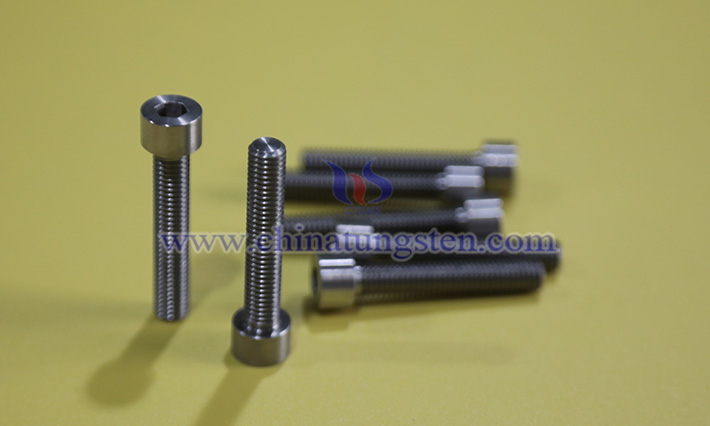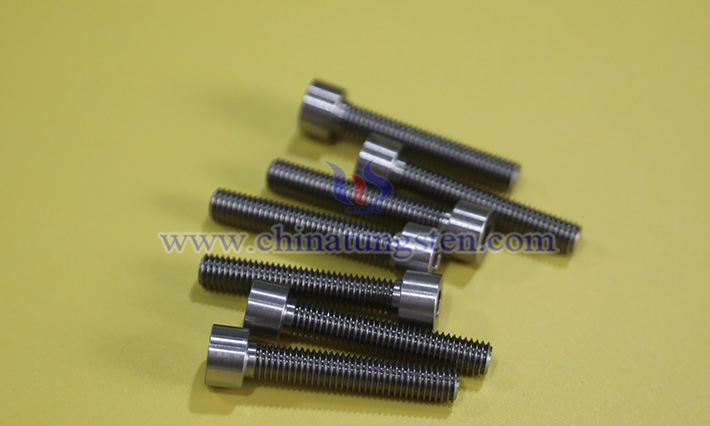Performance Comparison of Tungsten Alloy Screws with Other Screws
- Details
- Category: Tungsten Information
- Published on Wednesday, 24 September 2025 14:18
In the field of modern engineering, screws serve as critical connecting elements, with their material properties significantly impacting the reliability, durability, and adaptability of structures to various application scenarios. Tungsten alloy screws stand out in high-demand environments due to their unique physical and chemical characteristics, while other screws, such as titanium alloys, molybdenum alloys, and stainless steel, each offer distinct advantages. The following text primarily discusses the performance comparison of tungsten alloy screws with other screws.

High-Temperature Resistance: Tungsten alloy screws excel in high-temperature environments due to their high melting point and excellent thermal stability. By optimizing toughness through the addition of other metal elements, they maintain structural integrity under thermal stress, making them suitable for applications such as aviation engines, nuclear reactors, or high-temperature furnaces. In contrast, titanium alloy screws perform slightly less effectively at high temperatures, with their surfaces potentially deteriorating due to oxidation, limiting their use in extreme heat environments. Molybdenum alloy screws also offer good high-temperature resistance, suitable for vacuum furnaces or heat treatment equipment, but their heat resistance limit is slightly lower than that of tungsten alloys, potentially leading to performance degradation during prolonged high-temperature operations. Stainless steel screws have weaker high-temperature resistance, tending to soften or deform at elevated temperatures, and are thus only suitable for medium-to-low-temperature environments.
Mechanical Performance: Tungsten alloy screws are renowned for their high hardness and tensile strength, capable of withstanding high torque and continuous vibration, with strong wear resistance that prevents thread wear or loosening, making them ideal for high-strength connection scenarios such as precision machinery or heavy equipment fixation. Titanium alloy screws are distinguished by their high strength-to-weight ratio, good ductility, and excellent fatigue resistance, making them suitable for dynamic load environments, though their lower surface hardness results in less wear resistance compared to tungsten alloys. Molybdenum alloy screws have mechanical strength close to that of tungsten alloys but may develop micro-damage under high friction or extreme loads, with slightly inferior durability. Stainless steel screws offer balanced mechanical performance, suitable for general connections, but their strength and wear resistance are far inferior to tungsten alloys, making them inadequate for high-strength requirements.

Chemical Stability: Tungsten alloy screws effectively resist corrosion from acids, alkalis, and oxidizing gases, maintaining stability in complex environments containing oxygen, nitrogen, or sulfur, thus extending their service life. Titanium alloy screws perform exceptionally well in marine saltwater or acid-alkaline environments, primarily due to the natural protective oxide layer that forms on their surface. Molybdenum alloy screws are stable in mild chemical environments but may experience localized corrosion in chlorine-rich or high-humidity conditions, requiring additional protection. Stainless steel screws exhibit good corrosion resistance and strong rust prevention in humid environments, but their performance falls short of tungsten alloys or titanium alloys when exposed to strong acids or high-temperature oxidation.
Weight and Processability: The high density of tungsten alloy screws results in greater weight, increasing overall load and making them unsuitable for lightweight designs, while their high hardness poses significant processing challenges. Titanium alloy screws are known for their lightweight properties, reducing structural weight; although processing requires an inert environment to prevent contamination, they are compatible with modern CNC technology, making them suitable for mass production. Molybdenum alloy screws have a weight intermediate between tungsten and titanium alloys, with good processability, fitting well into mid-to-high-end industrial production. Stainless steel screws have moderate weight, are easy to process, and are cost-effective, making them ideal for large-scale production.
- Chinatungsten Online: www.tungsten-alloy.com
- CTIA GROUP LTD: en.ctia.group
- Tungsten News & Price: www.ctia.com.cn
- Molybdenum News & Price: news.molybdenum.com.cn
- Tel.: 86 592 5129696; Email: sales@chinatungsten.com



 sales@chinatungsten.com
sales@chinatungsten.com